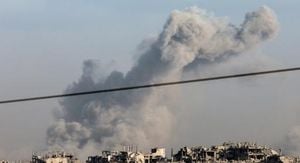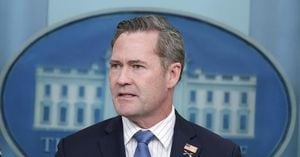Turkey is currently facing unprecedented economic challenges, as record inflation continues to burden the nation. The country is grappling with soaring prices made worse by economic mismanagement, high global energy costs, and significant depreciation of its currency.
Throughout 2023, Turkey's inflation rate has escalated rapidly, devastating families and businesses alike. Major cities like Istanbul and Ankara are witnessing firsthand the impact of these rising costs, creating widespread public discontent.
President Recep Tayyip Erdoğan, who has faced mounting pressure to address these issues, recently stated, "Inflation is the number one enemy of the economy". His administration's struggle to maintain monetary stability has seen the Turkish lira lose more than 50% of its value against the dollar over the past year, making imports exceedingly expensive.
The effects of inflation extend beyond numbers, as many everyday Turks feel the crunch. Mustafa, a small business owner, lamented, "We cannot live like this anymore," summing up the despair felt by many. Grocery store shelves report empty sections and prices spiking weekly, as inflationary pressures make basic goods increasingly unaffordable.
To combat these challenges, the Turkish government has implemented various policy measures aimed at curbing inflation. Interest rates have been adjusted, as officials try to balance between stimulating growth and taming rising prices. Emergency measures have also included price caps on basic food items and efforts to stabilize the currency.
Despite these efforts, the measures have yet to yield significant improvements. Many citizens continue to express frustration as wages fail to keep pace with rising costs. Ayşe, a resident of Istanbul, shared her plight, stating, "People are struggling to buy basic goods," highlighting how even daily necessities have become luxuries for some families.
The government’s initiatives have come under scrutiny, as the effectiveness of these measures is questioned. Analysts note the need for comprehensive reform and sustainable economic strategies rather than short-term fixes.
Small businesses are particularly hard hit, with many owners caught between rising operational costs and decreasing consumer spending power. The tension on the ground is palpable, as merchants grapple with how to stay afloat amid plunging sales.
Experts suggest the path forward for Turkey should include transparency, clear communication of economic policies, and genuine engagement with the international community to restore investor confidence. Building trust with foreign investors is key, especially as Turkey seeks to stabilize its economy and attract much-needed capital.
Looking to the future, the challenges facing Turkey appear substantial. With national elections looming, the economic situation may play a pivotal role, influencing both voter sentiment and policy direction.
Erdoğan's administration will need to devise more efficient solutions to address systemic issues; failing to do so could risk deepening the economic crisis. Citizens are watching closely, hoping for tangible improvements not just on paper, but at the checkout as well.
Turkish officials face the dual task of managing public discontent and recalibrifying economic strategies effectively. The coming weeks and months will be pivotal as the nation's leadership navigates these uncharted waters, with the wellbeing of millions at stake.



